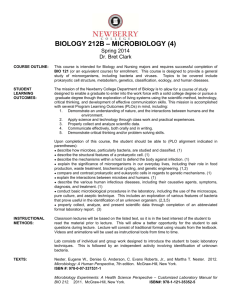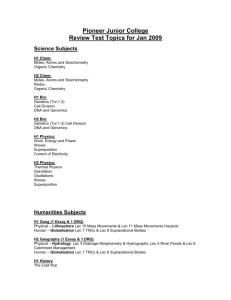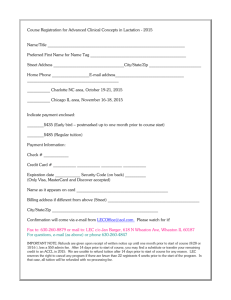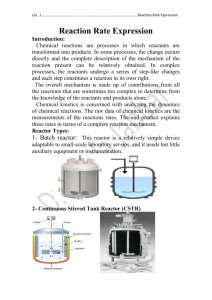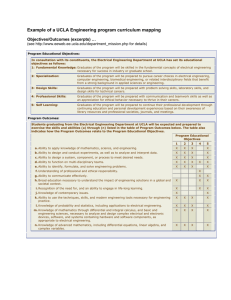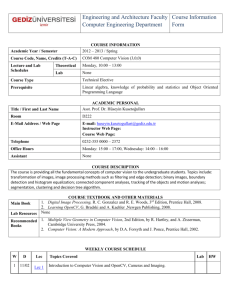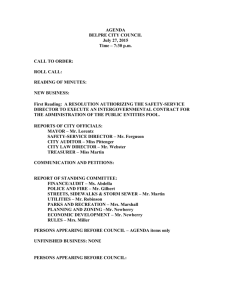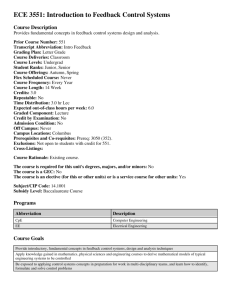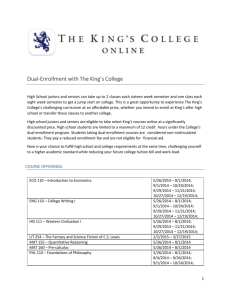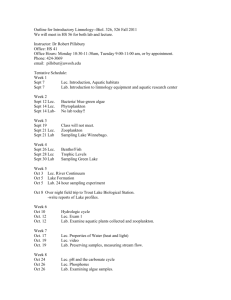biology 121a - biological science (4) - Newberry
advertisement
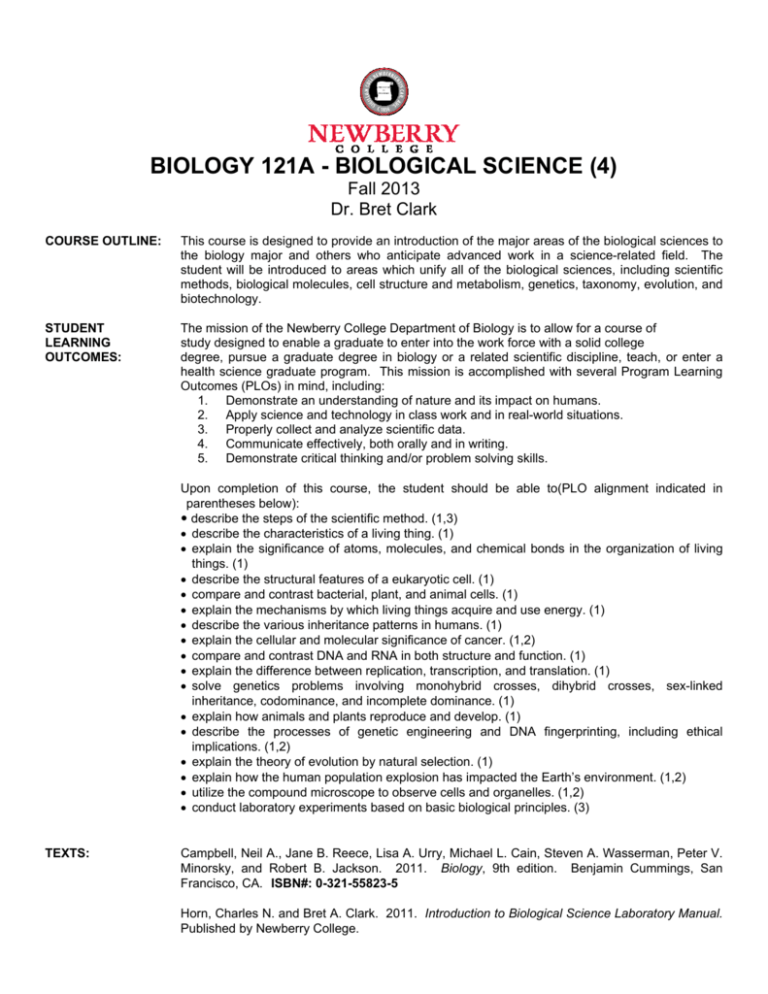
BIOLOGY 121A - BIOLOGICAL SCIENCE (4) Fall 2013 Dr. Bret Clark COURSE OUTLINE: This course is designed to provide an introduction of the major areas of the biological sciences to the biology major and others who anticipate advanced work in a science-related field. The student will be introduced to areas which unify all of the biological sciences, including scientific methods, biological molecules, cell structure and metabolism, genetics, taxonomy, evolution, and biotechnology. STUDENT LEARNING OUTCOMES: The mission of the Newberry College Department of Biology is to allow for a course of study designed to enable a graduate to enter into the work force with a solid college degree, pursue a graduate degree in biology or a related scientific discipline, teach, or enter a health science graduate program. This mission is accomplished with several Program Learning Outcomes (PLOs) in mind, including: 1. Demonstrate an understanding of nature and its impact on humans. 2. Apply science and technology in class work and in real-world situations. 3. Properly collect and analyze scientific data. 4. Communicate effectively, both orally and in writing. 5. Demonstrate critical thinking and/or problem solving skills. Upon completion of this course, the student should be able to(PLO alignment indicated in parentheses below): y describe the steps of the scientific method. (1,3) • describe the characteristics of a living thing. (1) • explain the significance of atoms, molecules, and chemical bonds in the organization of living things. (1) • describe the structural features of a eukaryotic cell. (1) • compare and contrast bacterial, plant, and animal cells. (1) • explain the mechanisms by which living things acquire and use energy. (1) • describe the various inheritance patterns in humans. (1) • explain the cellular and molecular significance of cancer. (1,2) • compare and contrast DNA and RNA in both structure and function. (1) • explain the difference between replication, transcription, and translation. (1) • solve genetics problems involving monohybrid crosses, dihybrid crosses, sex-linked inheritance, codominance, and incomplete dominance. (1) • explain how animals and plants reproduce and develop. (1) • describe the processes of genetic engineering and DNA fingerprinting, including ethical implications. (1,2) • explain the theory of evolution by natural selection. (1) • explain how the human population explosion has impacted the Earth’s environment. (1,2) • utilize the compound microscope to observe cells and organelles. (1,2) • conduct laboratory experiments based on basic biological principles. (3) TEXTS: Campbell, Neil A., Jane B. Reece, Lisa A. Urry, Michael L. Cain, Steven A. Wasserman, Peter V. Minorsky, and Robert B. Jackson. 2011. Biology, 9th edition. Benjamin Cummings, San Francisco, CA. ISBN#: 0-321-55823-5 Horn, Charles N. and Bret A. Clark. 2011. Introduction to Biological Science Laboratory Manual. Published by Newberry College. INSTRUCTIONAL METHODS: Classroom lectures will be based on the listed text, so it is in the best interest of the student to read the material prior to lecture. This will allow a better opportunity for the student to ask questions during lecture. This course will consist of traditional lecture format using the chalkboard, as well as images from the textbook. Videos and animations will be used as instructional tools from time to time. Laboratory sessions will consist of experiments and techniques relating to the topics being discussed in class. COURSE SCHEDULE: Lecture: Lab: OFFICE HOURS: M,W,F M 8:00-8:50am Room SM 206 1:00-3:50pm Room SM 207 Room SM 219, (803) 321-5255 bret.clark@newberry.edu Visit my website at www.newberry-college.net/bclark INFORMATION TECHNOLOGY: M,F 10-11:00am Tu 8-10:50am W 11:00am-12:00noon Th 8-10:50am; 12:15-1:40pm or by appointment Through Wolf Den, all students have free access to Microsoft 365 that provides functionality equivalent to the latest version of Microsoft Office such as Word, Excel and PowerPoint. Also included is a free service called “SkyDrive,” where students can securely store all documents. A student’s Wolf Den account, as well as Microsoft 365 and SkyDrive, can be accessed by virtually any network-capable computer on or off campus. To meet Program Learning Outcomes for the academic year 2013-14 and to provide access to technology, students in the Department of Science and Mathematics (Biology, Chemistry, Mathematics, Environmental Science, Forensic Science, Computer Science, Physics) will be required to use a computer with a minimum operating environment of Windows 7 and Microsoft Office 2010 or 2013 (including Word, PowerPoint, Excel). CACP CREDIT: All students wishing to graduate from Newberry College are required to participate in the Communication Across the Curriculum Program (CACP) by showing the ability to write papers at three levels. Attached to this syllabus is information on an assignment that will satisfy CACP level 2 criteria. POLICY ON ACADEMIC INTEGRITY: Academic integrity at Newberry College assumes that all work, written or oral, submitted by a student is that student’s own work. The student must adhere to the College’s policy, which deals severely with cheating—including plagiarism. Plagiarism is the theft of another person’s words or ideas. It is a dishonest, unethical attempt to claim someone’s work as your own—and will not be tolerated in this class. Students who fail to comply will receive one of these penalties: (1) A paper may receive a grade of “0”; a Report of Academic Dishonesty will be filed as part of the student’s record in the Registrar’s Office, (2) A student may receive a grade of “F” for the course; a Report of Academic Dishonesty will be filed with the Office of Academic Affairs and the Office of the Registrar, as part of that student’s permanent record, (3) A student whose offense is particularly heinous may be remanded to the Academic Integrity Committee, which may result in a judicial sanction and/or expulsion. For complete explanation of academic integrity, students must review the complete Academic Integrity Policy and the Academic Dishonesty Report form located on the Academics webpage at Homepage > Academics > Resources > Documents>Academic Integrity Policy AND Homepage > Academics > Resources > Documents>Academic Dishonesty Report. -----------------------------------------------------------------------------------------------------------------------------------------------------------------BIO 121 - COURSE SCHEDULE ------------------------------------------------------------------------------------------------------------------------------------------------------------------ Week of Topic Text Chapters 19 Aug Lec: Life, Classification Lab: Data Collection, Analysis, and Presentation (Independent Study) 1 lab 1 26 Aug Lec: The Scientific Method; Chemistry of Life Lab: Measurements and Microscopes 1,2 lab 2 2 Sept Lec: Chemistry of Life (cont'd) 3-4 9 Sept Lec: Chemistry of Life (cont’d) Lab: Enzyme Activity 5 lab 5 16 Sept Lec: Cell Structure and Function; Energy and Enzymes Video: An Introduction to the Living Cell Lab: Cell Structure and Function 6,8 lab 3 23 Sept Lec: Membranes, Metabolism Lab: Diffusion and Osmosis 7,9 lab 4 30 Sept Lec: Photosynthesis, Cellular Reproduction and Mitosis Lab: LAB QUIZ I 10,12 7 Oct Lec: Mieosis Lab: Respiration and Photosynthesis 13 labs 6&7 14 Oct Lec: Genetics Lab: Mitosis and Cytokinesis 14-15 lab 8 21 Oct Lec: Genetics (cont’d) Lab: Human Biology 14-15 lab 10 28 Oct Lec: DNA and RNA, Transcription and Translation Lab: Genetic Analysis of Corn 16-17 lab 9 4 Nov Lec: Mutations and Cancer, Biotechnology Lab: Molecular Biology 17,20 lab 11 11 Nov Lec: Evolution, Animal Reproduction Video: The Evidence for Evolution Lab: Video and Discussion: New Choices, New Dilemmas 22-24,46 18 Nov Lec: Animal Development Lab: Animal Development 47 lab 15 25 Nov Lec: Plant Reproduction and Development; Population Ecology Lab: LAB QUIZ II 38,53 - ------------------------------------------------------------------------------------------------------------------------------------------------------------------ -----------------------------------------------------------------------------------------------------------------------------------------------------------------EXAM SCHEDULE -----------------------------------------------------------------------------------------------------------------------------------------------------------------Exam Material Covered Date Lecture Exam 1 Chs. 1-4 Friday, 6 Sept Lecture Exam 2 Chs. 5-6,8 Monday, 23 Sept Lecture Exam 3 Chs. 7,9-10,12-13 Wednesday, 9 Oct Lecture Exam 4 Chs. 14-17 Friday, 1 Nov Lecture Exam 5 Chs. 17,20,22-24,46-47 Monday, 18 Nov Final Exam 15% new material (Chs. 38,53) Friday, 6 Dec @ 12noon 85% comprehensive -----------------------------------------------------------------------------------------------------------------------------------------------------------------EXAMS: There are five lecture exams scheduled in this course in addition to the final. Of these five lecture exams, each student will be able to drop the lowest grade. This does not apply to the final exam every student must take the final on its scheduled date. The final exam will be cumulative and will cover material from the entire course. In addition, about 15% of the final exam will consist of new material. Lecture exams will include multiple choice, fill in the blanks, short answer, and essay questions. There may be some matching questions from time to time. LABORATORY: Laboratory Quizzes: On the following dates, we will have a lab quiz on the listed material (20 points each): Midterm Lab Quiz – Monday, 30 Sept (labs 1-5) Final Lab Quiz – Monday, 25 Nov (labs 6-11,15) Each lab quiz will be in the form of a laboratory practical with 20 stations. Each station will consist of a question or item for identification. Students will have one minute at each station and will move around the room in unison. You will not be responsible for memorizing actual data from experiments because these values may be different for every student. Instead, you will be responsible for answering fundamental questions relating to experimental biology: • What? - What was done during the particular lab session? What materials and equipment were used? What were these materials used for? What was this lab designed to prove? • Why? - Why was this lab useful? Why was this experiment designed this way? • How? - How was the experiment designed? How did you interpret the data? Laboratory Manual Grading: On the following dates, your laboratory manuals will be collected and graded for content and neatness. I will look to see that all data has been entered, all drawings have been labeled, and all questions have been answered (20 points each): Friday, 20 September Friday, 25 October Monday, 25 November NOTE: Your laboratory manual should reflect your work. Even though you might have a partner during some of the lab sessions and your data will be the same as your partner's, drawings and answers to questions should be original and reflect your individual impression of the work that you are doing in lab. In other words, copying someone else's lab manual is not acceptable and will result in a grade of 0 for both the person who copied and the person he/she copied from. MAKE-UPS: Lecture Exams: Lecture exams must be taken on or before the scheduled date. If you know that you will not be able to take an exam on the scheduled date, you may make arrangements with the instructor to take the exam early. There will be no make-ups of missed lecture exams. Missed exams will count as the allotted drop grade. This does not apply to the final exam. Everyone must be present for the final exam as there will be no make-ups under any circumstances. Failure to take the final exam will result in failure of the course. Laboratories: Please make every effort to attend the laboratory sessions at their scheduled time. If you should miss a lab, you should make arrangements with the instructor for a suitable time for you to come in and complete missed laboratory assignments. To ensure that equipment and supplies are available for your use, missed lab sessions must be made up within one week of the lab in question. Lab Practicals: The lab practicals should be taken on their scheduled dates. However, if you miss a lab practical, you must make it up within 24 hours (unless other arrangements are made with the instructor within this 24 hour period). Failure to make up a lab practical within the appropriate time period will result in a grade of 0. I reserve the right to give a more difficult makeup lab practical. ATTENDANCE: Absences in excess of 15% of the total lecture and laboratory sessions will result in a letter grade deduction in your final grade. Further absences beyond this may result in a grade of FA (failure due to absences). Please note that this means you can only miss nine total lecture and/or lab sessions! Tardiness interrupts the class and will not be tolerated. A tardiness policy will be enforced (3 tardies = 1 absence). EMERGENCY SITUATIONS: In case of a pandemic or any emergency situation on campus, please visit the following Newberry College web page frequently for updated information and instructions: Home>Policies>Emergency Management In addition, students are expected to adhere to the College’s Pandemic Preparation Plan, including taking appropriate personal preventive measures to avoid contracting influenza and other communicable diseases, minimizing personal contact with others when feeling ill, and following instructions of Newberry College administration/Health Services Center personnel as provided in the following link: Home>Campus Life>Student Services>Health Services Individual students who are sick should notify course faculty of their illness as soon as possible to develop a plan for completion of course requirements within the timeframe of the course. If students are quarantined and therefore unable to attend class or if face-to-face classes are cancelled because of a pandemic emergency or weather, students in this class are encouraged to check their campus e-mail, as well as the course link on WolfDen, for updates and assignments. It is the responsibility of the student to ensure that he/she keeps up with course material during an extended period of absence or campus closure. CLASSROOM ETIQUETTE: The use of electronic equipment such as cell phones, calculators, and music playback devices (e.g. iPods) is prohibited during class. Specifically, students may not make or accept cell phone calls, accept or send text messages, read or send e-mail messages, or listen to recorded media during class. In addition, electronic equipment must be stowed away in the OFF position during lecture. Laptops can be used in class, but only for note-taking. Students found using their laptops for something other than course-related work will be restricted from bringing their laptops to class for the remainder of the semester. Students should not interrupt the lecture session by leaving his/her seat except in the case of an extenuating circumstance that has been discussed in advance with the professor or an emergency. COURSE EVALUATION PROCEDURES: 5 Lecture exams, 100 points each (you may drop the lowest of these five grades for a total of 400 points) Comprehensive Final exam, 100 points Laboratory Grade, 100 points (2 lab quizzes and 3 lab manual grades @ 20 points each) Total points: 600 A = 90-100%; B+ = 87-89%; B = 80-86%; C+ = 77-79%; C = 70-76%; D+ = 67-69%; D = 60-66%; F = <60% Successful completion of BIO 121 with a grade of C or better is required to continue in the Biology major! CENTER FOR Student Support Services: The mission of the Center for Student Success is to support each STUDENT SUCCESS: student’s educational goals by offering opportunities to enrich and enhance their academic environment. Services offered to support this mission are free and include: Individual Academic Specialty Assistance, Career Services, Content and Writing Assistance, Disability Services, International Programs, and Retention. The Center for Student Success is located in Wessels Library and is part of the Educational Services Division. Hours for the Fall Semester are 7:30 a.m. to 5:00 p.m., Monday through Friday. Content and/or Writing Assistant opportunities are posted under the Student Success tab in WolfDen or requests may be sent to tutor.request@newberry.edu. If using the web mail request, please include your name, professor, course and number. These requests will be answered within 24 business hours. Learn more about all Center services and access all policy statements and relevant forms by clicking on the Student Success tab in WolfDen. Policy on Special Needs—Students with Special Needs: Students who wish to enroll or are already enrolled in the Disability Services Program must identify themselves and present documentation of their disability signed by an approved professional in order to have an accommodation letter put in place. This can be accomplished by contacting Ms. Kay Chandler in the Center for Student Success by phone (803-321-5187), e-mail (kay.chandler@newberry.edu), or in person to schedule an initial meeting. ALL records are kept confidential for the protection of our students. Once approved for accommodations, students are responsible for scheduling a conference with their professors to discuss how to implement these accommodations. However, please note that instructors are not permitted to discuss students’ disabilities with them until they have registered with the Office of Disabilities Support Services.
